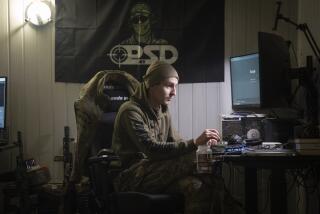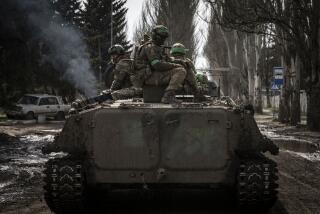Ground Troops Psych Selves for Combat : Military: Tank cannons are calibrated. And emotions are put in order before offensive.
- Share via
WITH U.S.-LED FORCES IN THE GULF WAR — As the mood of battle seemed to change from early euphoria to stronger determination Monday, allied ground forces exchanged sporadic fire with the Iraqis occupying Kuwait, calibrated their tank cannons, played grim games to psych themselves for close combat and pawed the ground awaiting the call to advance--whether now or later, they knew not.
While the big picture came in briefings in the rear and at the Pentagon, the front-line news came in many ways:
It came morbid. With the 325th Infantry, a soldier prepares 50 “death” cards to carry in an attack and place atop Iraqi casualties. “Personal debt paid,” they read.
Through the years, troops have readied for combat in similar fashion, usually blocking from their minds that just over the horizon opposing soldiers are probably doing the same.
The news came full of bravado. From the very leading front of the war, where the waiting game is peppered with exchanges of fire, Marine helicopter pilots reported knocking out Iraqi outposts with impunity, while a Marine artillery battery responded with 155-millimeter howitzers to Iraqi shelling.
All across the allied lines in Saudi Arabia, soldiers, Marines and hundreds of helicopters were reported on the move--inching closer to Kuwait and the possible showdown on the ground with Saddam Hussein’s occupying army.
The significance of such movements heightened the feeling of impending battle, but this was nourished chiefly by that time-worn enemy of fighting men and women, the war drums of rumor.
Gun smoke and ear-splitting reports wafted across the wide-open Arabian sands.
“It’s going to be like the old British battles of the (American) Revolution. He is there, we are here, let’s slug it out,” said Specialist Paul Harris of Kansas City, Mo.
The news came from down deep. A dispatch from the Red Sea disclosed, somewhat obliquely, that “a submarine was deployed to fire a cruise missile for the first time in the war.”
The news came from videos. In the ward rooms of the aircraft carrier John F. Kennedy, scenes of precise bomb hits on Iraqi targets were run on a special war channel, MTV-style. “Iraq Attack,” one was named. Another, “Slam Video.”
The young music-oriented generation of pilots also told how they turn to song to psych themselves up before bombing raids and then unwind afterward. A bombing run can take hours in a cramped cockpit, and one pilot said he plugs in his Walkman on the approach and listens to heavy metal rock bands. Something softer is carried to unwind on the hop home.
In between, though, there is only the horrifying shriek of battle and the energizing, ear-pounding sensation of aerial combat. Stealth fighter pilot Klaus J. Klause reduced it to terms all can understand, flying a black dart through skies red with tracers, thinking: “Oh God, they’re shooting at me.”
And the news came as it has for countless untested warriors through the centuries, in moments of private introspection and with upwelling last-minute doubt.
“I’ve gone over my equipment a hundred times. I got a lot of quiet time to reflect about what’s going to happen, how it’s going to go down,” said Army Sgt. Timothy Alspach of Groveland, Ohio. “I wonder how I’m going to react to seeing one of my best buddies dying?”
This account was prepared from pool reports that passed through the military for approval.
More to Read
Sign up for Essential California
The most important California stories and recommendations in your inbox every morning.
You may occasionally receive promotional content from the Los Angeles Times.













